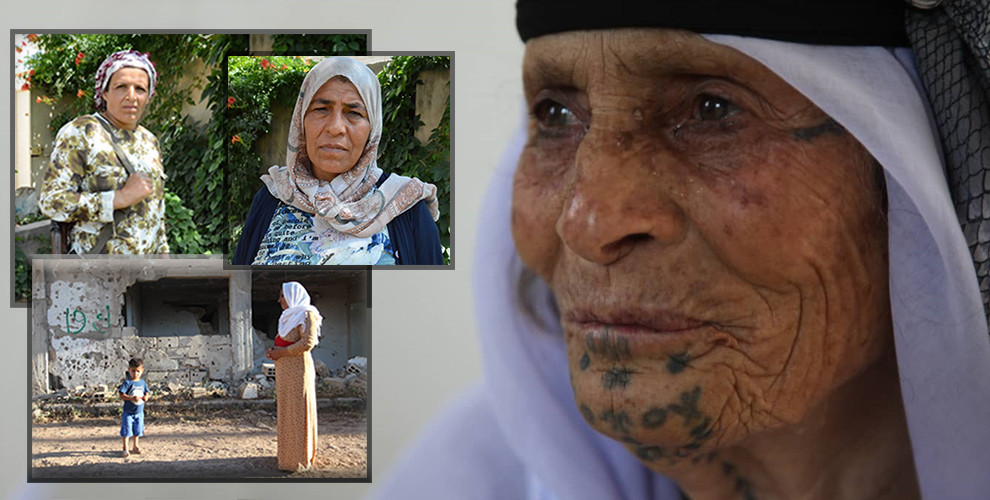Faces of the revolution of Rojava
Six years ago, the Rojava revolution began. It became a revolution of women. Innumerable mothers have contributed to this.
Six years ago, the Rojava revolution began. It became a revolution of women. Innumerable mothers have contributed to this.

Women's Defense Units YPJ became the face of the revolution of Rojava. These predominantly young women have forced their battle to bring the cruellest men in the world to their knees, the so-called Islamic State.
One of the greatest sources of power of the revolution, along with the YPJ, was the mothers of Rojava. That this rebellion could not be defeated despite all attacks, is also due to these mothers, who bring in body and soul in the fight.
In Kobanê, where the revolution began six years ago, we talked to some of the mothers and asked them about their stories.
"We were born here, we will die here"
Xanim Şêx Hesen is 82 years old. She lives in the neighborhood of Kaniya Kurda in Kobanê. Xanim is the mother of six children. In the 1980s she made acquaintance with the Kurdish liberation struggle. Since then her heart beats for a free Kurdistan. One of her sons lost his life in the ranks of the PKK in 1996. Some of her relatives died in 2015 during the ISIS massacre in Kobanê.
When the ISIS attacked the city in 2014, Mother Xanim's house was severely damaged. But she does not care. "The ISIS was defeated in Kobanê," she says, adding, "They want to drive us out of our homeland. But we were born here, here we will die here."
Mother Xanim has opened her home to the people of Afrin who had to flee from the Turkish military invasion. She shows practical solidarity and says, "First they destroyed Kobanê and now Afrin."
Women gained self-confidence
Naile Mihemed works in the hospital of Kobanê. She is 55 years old and has five children. "The revolution has granted us women rights. Therefore, there is no age limit at work for this revolution. Only then have we left our homes and begun to be useful to ourselves and society. We gained self-confidence as women."
The neighborhood of Şehîd (Martyr) Serhed, where Naile lives, was one of the most violent scenes of war in the fight against ISIS. Here, so to speak, was laid the foundation for the victory of Kobanê. Naile is aware of this and says that she has returned to the neighborhood for that reason. "To rebuild the city, everyone has rolled up their sleeves. The supply of basic necessities was ensured through solidarity among people."
The mother who fought against the ISIS
Helime Osman has five children and is forty years old. She was born in Kobanê and is one of the women who participated in the expulsion of the Baath regime from the city. When the ISIS attacked, she took part in the defense. She sent her children to Amed and fought shoulder to shoulder with the YPJ/YPG with her husband.
Due to health problems, Helime was sent by the fighters from the city as the fighting became more violent. Her husband remained there until the liberation from the ISIS. Helime and her children returned immediately afterwards. Now she works at the headquarters of the women's movement Kongreya Star as a security member. "The revolution of Rojava has taught us to protect our lives and our institutions. I'm responsible for the security of my organization," she says.
"I am your mother"
Semira Ehmed also lives in Kaniya Kurda. She is 47 years old and has eight children. When the revolution began, she immediately took part in women's work despite her family responsibilities. She became a member of Yekitiya Star, a precursor to today's Kongreya Star. At the time of the ISIS attack she remained in the city despite her children. She tells the reason for this as follows:
"We were scared when the ISIS came, but before my eyes a fighter from Amed died to protect us. He was injured, fell to the ground and called for his mother. That happened right in front of my eyes. I tried to raise him and said, 'I am your mother.' After that, I could not leave the city. I had given my word to this young man, I was now his mother and had to protect our country. That's why I did not go away during the fighting. Today Kobanê is free and we women are working for our revolution. We are thankful to our martyrs."